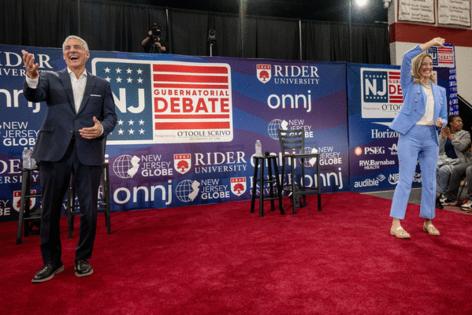Suing Trump, remembering Charlie Kirk, and ending school segregation: What you missed in the NJ governor's race debate
Published in News & Features
LAWRENCEVILLE, N.J. — About 1,500 people filled a gymnasium in Lawrenceville on Sunday night to watch the first debate between the two candidates vying for New Jersey governor: U.S. Rep. Mikie Sherrill, the Democratic nominee, and Jack Ciattarelli, the GOP nominee.
Both candidates made the case that they would make New Jersey more affordable. They answered questions from moderators and attendees at Rider University ranging from a 12-year-old who rejected Ciattarelli’s fist bump after asking about trust in government, to a 96-year-old who asked about whether school districts should be required to merge to save the state money.
Ciattarelli criticized Sherrill for not giving specifics, while Sherrill criticized him for “telling anybody what they want to hear.”
They both shifted their tones on certain issues from in the primaries — Sherrill on immigration and Ciattarelli on vaccines. Here’s some of what you missed:
Responding to Charlie Kirk’s assassination
Sherrill didn’t answer whether she supports a Republican-led proposal that would make political violence a hate crime in New Jersey following the assassination of conservative activist Charlie Kirk.
She told reporters after the debate that she would have to take a closer look at its wording to ensure there aren’t free speech rollbacks. Ciattarelli supports it.
Sherrill voted in favor of a resolution praising Kirk’s legacy on Friday despite dozens of Democrats opposing the measure. She released a statement after it passed explaining that she voted to condemn his assassination even though she disagreed with him.
“Charlie Kirk was advocating for a Christian nationalist government and to roll back the rights of women and Black people — this flies in the face of every value I hold dear and that I fight for,” she said. “But the Constitution protects free speech, even for those I vehemently oppose.”
Ciattarelli said in the debate that her statement condemning Kirk shortly after voting to celebrate his life “was wrong.”
One attendee wore a shirt calling Kirk a “true patriot.” Beside him, another sported a “Make New Jersey Great Again” hat and a shirt with a photo of President Donald Trump holding his fist up after surviving an assassination attempt in Butler.
Ciattarelli, a former Trump critic-turned-loyalist, was enthusiastically endorsed by the president earlier this year.
Changes to New Jersey’s tax system
The Sherrill campaign has been attacking Ciattarelli for recently saying that “all options are on the table” for changing the state’s tax rates and mentioning a higher sales tax in Tennessee multiple times.
But Ciattarelli took a more defined stance on Sunday, declaring that he would not raise the sales tax. He also promised to lower property and income taxes.
Sherrill said Ciattarelli’s “math just doesn’t add up” given the state’s financial pressures, including paying into pensions.
Ciattarelli’s campaign, on the other hand, attacked Sherrill for not making the same commitment to not raise sales taxes.
“I’m not going to commit to anything right now, because I’m not going to just tell you what you want to hear,” Sherrill said.
“I’m going to be fiscally responsible with your money,” she added.” I’m going to drive down your costs at every level, and I’m going to make sure your kids have great opportunities.”
Ciattarelli pointed to Pennsylvania’s 3.07% flat personal income tax rate and proposed three tax brackets for New Jersey of 3-5%.
“We’re losing people to Florida, we’re losing people to Pennsylvania,” he said.
Sherrill moderating her stance on immigration
Sherrill pledged during the Democratic primaries that she would keep the state’s Immigrant Trust Directive, which limits the state’s cooperation with ICE. She took heat from progressives for not supporting the Immigrant Trust Act, which would take the limitations further.
But on Monday, Sherrill did not answer whether she supports the directive during the debate or when pressed by reporters afterward. She instead argued that she supports the Constitution, and that ICE agents should no longer be allowed to be masked while conducting raids.
Ciattarelli, on the other hand, said he will end the state’s Immigrant Trust Directive, referred to as its sanctuary state policy, on his first day in office, arguing that it gets in the way of public safety.
Ciattarelli supporters jeered at Sherrill throughout the debate, including someone who repeatedly shouted “What about Laken Riley?” referring to a young woman whose murder in Georgia led to a national immigration law that allows undocumented people to be detained if they’re accused of crimes such as theft.
Sherrill, who opposed the measure, argued that she’s prosecuted undocumented immigrants with due process while working as a federal prosecutor.
Ciattarelli moderating his tone on vaccines
Ciattarelli garnered favor with a so-called parental rights groups during the primary for supporting “medical freedom” for vaccines, and his campaign website still says he “will oppose a one-size-fits-all vaccination schedule.” His site says he supports medical and religious exemptions, and giving parents seeking a philosophical exemption “more of a voice” in state government.
In the debate, he said he supports the vaccine schedule for measles, mumps, rubella, whooping cough, and polio. He did not mention exemptions.
“We’ve got to get above the threshold for herd immunity to keep our communities safe,” he said. “The obligation of any governor on day one after they take their oath of office is the public health and safety.”
Sherrill said she would join governors banding together to make their own vaccine recommendations in light of the Trump administration’s changing health policies and criticized Ciattarelli for not speaking out against Secretary of Health and Human Services Robert F. Kennedy, Jr., who has led national efforts to question vaccines.
“He doesn’t mention anything about how Trump’s appointee gets most of his medical information on TikTok and Reels,” she said.
Fighting Trump in court
Sherrill said her attorney general appointee will sue Trump’s administration “to claw back as much money from the federal government as we can” and denounced the Trump administration for abolishing the federal Department of Education.
Ciattarelli said that he doesn’t “necessarily have a problem” with Trump downsizing the department, and that “just because they got rid of the Department of Education doesn’t mean they got rid of federal funding.”
“They did!” some audience members shouted at him.
Sherrill shot back that the federal government got rid of state education funding for research and Pell Grants, and limited the amount of money that can be taken out for student loans, which can get in the way of medical schooling.
Ciattarelli said his attorney general “will not be wasting your tax dollars suing the White House every other day” and said the best way to get money from the federal government is strategizing with the state’s congressional delegation.
School segregation
A moderator asked the candidates about whether they would continue to fight a lawsuit that argues the state isn’t doing enough to combat public school segregation that’s “rooted in longstanding housing discrimination and the number of small districts.” The candidates largely avoided addressing the lawsuit.
Ciattarelli argued that schools need to focus on getting students on grade level for reading, writing, and math with a new curriculum, and that simply desegregating schools won’t improve student performance.
“We do have the most segregated schools, but I wonder if we would be having this discussion if the performance of schools with predominantly Black student populations were outperforming schools with predominantly white populations,” he said in remarks that have since been criticized by Democrats.
He argued that failing school districts need school choice through the form of private school vouchers and charter schools, which he accused Sherrill of being against.
Sherrill said she has “worked hard on charter schools” and pointed to her running mate Dale Caldwell’s close involvement with them.
She also argued that utilizing county-based school systems through district consolidation can help address segregation in schools, but there also needs to be “high intensity tutoring” to combat learning loss and phonics-based reading for third-graders.
Sherrill also made the case that merging school districts can help the state save money. Existing efforts to do so haven’t gone very far, so she said she would be open to forced consolidation if necessary, a measure Ciattarelli opposes.
©2025 The Philadelphia Inquirer, LLC. Visit at inquirer.com. Distributed by Tribune Content Agency, LLC.












Comments